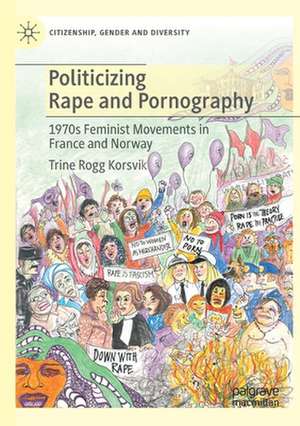Politicizing Rape and Pornography: 1970s Feminist Movements in France and Norway: Citizenship, Gender and Diversity
Autor Trine Rogg Korsvik Traducere de Elisabet Roggen Limba Engleză Paperback – 26 oct 2021
This text is relevant for students in history, sociology, health, political science, comparative politics and interdisciplinary gender studies. It is also relevant for researchers and activists whoare concerned with the history of feminism, feminist politics and sexual politics.
| Toate formatele și edițiile | Preț | Express |
|---|---|---|
| Paperback (1) | 383.40 lei 6-8 săpt. | |
| Springer International Publishing – 26 oct 2021 | 383.40 lei 6-8 săpt. | |
| Hardback (1) | 389.70 lei 6-8 săpt. | |
| Springer International Publishing – 25 oct 2020 | 389.70 lei 6-8 săpt. |
Preț: 383.40 lei
Nou
Puncte Express: 575
Preț estimativ în valută:
73.43€ • 75.65$ • 61.51£
73.43€ • 75.65$ • 61.51£
Carte tipărită la comandă
Livrare economică 24 februarie-10 martie
Preluare comenzi: 021 569.72.76
Specificații
ISBN-13: 9783030556419
ISBN-10: 3030556417
Pagini: 297
Ilustrații: XII, 297 p. 14 illus., 4 illus. in color.
Dimensiuni: 148 x 210 mm
Greutate: 0.37 kg
Ediția:1st ed. 2021
Editura: Springer International Publishing
Colecția Palgrave Macmillan
Seria Citizenship, Gender and Diversity
Locul publicării:Cham, Switzerland
ISBN-10: 3030556417
Pagini: 297
Ilustrații: XII, 297 p. 14 illus., 4 illus. in color.
Dimensiuni: 148 x 210 mm
Greutate: 0.37 kg
Ediția:1st ed. 2021
Editura: Springer International Publishing
Colecția Palgrave Macmillan
Seria Citizenship, Gender and Diversity
Locul publicării:Cham, Switzerland
Cuprins
1. The Sexual Revolution and the Women’s Liberation Movement.- 2. Addressing the Problem: Rape and Pornography Become Feminist Political Issues.- 3. The Women’s Liberation Movement Takes to the Streets Against Rape and Pornography.- 4. Success and Criticism of the Campaigns Against Rape and Pornography.- 5. Politicizing Rape and Pornography—What Now?
Notă biografică
Trine Rogg Korsvik is Senior Advisor at Kilden genderresearch.no in Norway, a national knowledge centre for gender perspectives and gender balance in research, and has taught at the Centre for Gender Research, University of Oslo. She holds a PhD in history, with a specialization in the history of women’s movements and feminism.
Textul de pe ultima copertă
This book examines how feminist movements in Norway and France have politicized rape, pornography and sexual exploitation of women from the 1970s to the present. Through a cross-national comparison, it provides insights into why the fight against rape became top priority for French feminists in the 1970s; what kind of strategies the feminist movements used when politicizing sex and violence; who the opponents of the feminist mobilizations were, and who the allies were; as well as what the feminist movements achieved and what the costs of the battles were. This book provides historical context for contemporary and contentious debates about the tension between feminism and sexual freedom, about sexual liberation and abuse, and about the limits of freedom of expression.
This text is relevant for students in history, sociology, health, political science, comparative politics and interdisciplinary gender studies. It is also relevant for researchers and activists who are concerned with the history of feminism, feminist politics and sexual politics.
This text is relevant for students in history, sociology, health, political science, comparative politics and interdisciplinary gender studies. It is also relevant for researchers and activists who are concerned with the history of feminism, feminist politics and sexual politics.
Caracteristici
Analyzes how rape and pornography was framed as gendered political questions by WLM activists in France and Norway Compares two important historical movements which at the time had minimal direct contact with each other Uses a range of primary sources, such as movement texts, newspapers, audiovisual material and interviews with former activists















